Alex C. Vick's Blog, page 594
November 5, 2017
Writing through writer's block
 As I begin to make some progress with the seventh (and final) book in the Legacy of Androva series, I got to thinking about how I could improve my writing process. There are still times when I hit a mental block in terms of how to take the story forward, even though I know my characters and the worlds they inhabit very well. And next year I'll be starting something brand new, so I won't even have that familiarity to fall back on. Now seems like a good time to come up with a strategy.
As I begin to make some progress with the seventh (and final) book in the Legacy of Androva series, I got to thinking about how I could improve my writing process. There are still times when I hit a mental block in terms of how to take the story forward, even though I know my characters and the worlds they inhabit very well. And next year I'll be starting something brand new, so I won't even have that familiarity to fall back on. Now seems like a good time to come up with a strategy.I already know that I can't outline, so plotting my way out of writer's block is not an option. The stories I invent whenever I try to figure things out in advance are--how can I put this?--not the best. And sometimes, not knowing what's coming next is a good motivator for me. I keep writing because I want to know what happens.
So, after due consideration, here is my Top Ten of ways to beat the block. (As always, I feel I should make it clear these are based on my own experiences and I am not an expert!).
Published on November 05, 2017 09:15
October 31, 2017
Spooky Quilling - Friends
Published on October 31, 2017 00:43
October 30, 2017
Surviving Magic (book six)!
 The sixth book in the Legacy of Androva series is going up for pre-order in the next few days! The Kindle version will be at the special price of $0.99/£0.99 until the date of release.
The sixth book in the Legacy of Androva series is going up for pre-order in the next few days! The Kindle version will be at the special price of $0.99/£0.99 until the date of release.The cover is again the work of the brilliant Kerry Hynds, who recently updated the rest of the series. It's difficult to choose a favourite cover, but I particularly love this one because of the amazing blue colour
Published on October 30, 2017 10:07
October 24, 2017
Spooky Quilling - The Supernatural
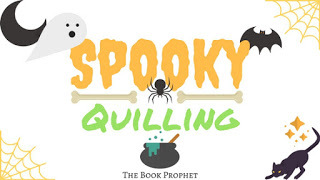 Spooky Quilling is now in its penultimate week! I've really enjoyed writing another spooky story for today's post, and I'd like to say a big thank you to Savannah at The Book Prophet, who is the creator of this challenge. You can read all about it here. There might only be one week left, but you can write a lot in a week (with the help of some great prompts!), so you should definitely think about signing up
Spooky Quilling is now in its penultimate week! I've really enjoyed writing another spooky story for today's post, and I'd like to say a big thank you to Savannah at The Book Prophet, who is the creator of this challenge. You can read all about it here. There might only be one week left, but you can write a lot in a week (with the help of some great prompts!), so you should definitely think about signing up
Published on October 24, 2017 07:24
October 21, 2017
Interview with Jax and Shannon about book six!
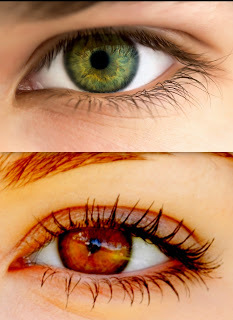 This interview is set after Breaking Magic.
This interview is set after Breaking Magic.Me: So… the next book will be released in two weeks. Jax: And? Are we actually in it this time? Shannon: I don’t know why you sound so keen. I’m quite enjoying the break. Jax: Where’s your sense of adventure? Shannon: Hmmm, let me think… I probably left it on the floor of the room where the Breaker tortured us. Jax: (rolls eyes) Funny. Me: Actually, the subject of the book was your idea, Jax. Jax: Mine? (pauses) You don’t mean this book is about Galen, do you? Me: (nods) Yes Jax: When can I read it? Shannon: Me too. When can we read it? Me: Ah, well, there’s a slight problem with that. Jax: What? Me: It kind of has spoilers in it. Jax: What on Androva is a spoiler? Shannon: It’s like something that gives away the plot of a story before you’ve read it. Jax: I don’t understand. He lived two thousand years ago. You can’t call ancient history a spoiler. Shannon: (frowns) I agree. Whatever he did with his life after we met him… why wouldn’t we be able to read about that? We can’t change anything now. Jax: Exactly. And even if we did find out something bad, it’s not like we can ever go back there again. Not even to help him. I destroyed the Signature Symbols so returning to Pompeii would be impossible. Shannon: Is that why we can’t read it? Because he got into trouble and we’d want to help him? (looks at Jax) You know we’d try. Even if it was impossible. Jax: Of course. And so does she. The author person. Me: It’s not just about the trouble Galen may or may not have encountered. Did either of you ever wonder what he did with the knowledge you gave him? Shannon: What knowledge? What are you talking about? Me: You told him about Angelus and the treaty. Jax: Yes. Obviously. So that he could create a spell to enable Shannon to become a magician in our time. (grins) Otherwise none of these books would have been possible. Me: Do you think that’s all he did? That one spell? When he knew thousands of people on both worlds were about to die?(silence) Shannon: You don’t mean… are you saying he tried to prevent it all from happening? Jax: You’re kidding me. That would be suicide. Galen was a great magician, but this is Angelus. The most prolific magical killer our worlds have ever known. Shannon: What happened to him? Please… I can’t bear the thought of him dying when he and Claudia had only just escaped. Me: Look, I can’t tell you. But if you’ll let me continue— Jax: (interrupts) You mean you won’t tell us. Anyway, it’s obvious what must have happened. Galen disappeared from Androva’s history one year before the treaty was signed. Me: (raises eyebrows) And history has never been misreported? Because everyone on Terra knows all about Angelus and the treaty, don’t they? Shannon: Point taken. What were you going to say before Jax interrupted you? Me: I was going to say that although I can’t tell you what happens in Galen’s story, I have already started to write the next book, which will be the last in the series. And I’m going to try to find a way to bring Galen’s story and yours together again, even if only at the end. Shannon: Does that mean Galen survives? Me: I said Galen’s story, not necessarily Galen himself. Shannon: But we will get to find out? Me: I will try. No promises. You should make the most of your break, though. Irrespective of Galen, you will be facing another powerful enemy. Jax: The last book in the series? But… how is everyone going to know what happens to us if you stop writing about it? Shannon: Are you serious? After hearing what she just said, that’s your question? Me: (laughs) I guess you’ll have to find a way to live the rest of your life without other people reading about it, Jax. If you live through the last book, of course. Jax: What? You wouldn’t dare… Shannon: (hides a smile) What about Penny and Darius? They’re going to be in the book too, aren’t they? Me: Of course. They have a big challenge to overcome. Shannon: Should I warn them? Jax: No. Darius will only worry. You know what he’s like. Me: I’m going to end the interview there. Thank you both very much for talking to me today.
I hope you enjoyed today’s post, and if you have ideas for any other characters you’d like me to interview, just let me know!
Published on October 21, 2017 07:52
October 16, 2017
Spooky Quilling - Survival
 The subject of today's Spooky Quilling prompt is survival, and it's all about the characters this time. Who they are, and how they deal with their circumstances, will determine the outcome. Oh, and it needs to be creative, too!
The subject of today's Spooky Quilling prompt is survival, and it's all about the characters this time. Who they are, and how they deal with their circumstances, will determine the outcome. Oh, and it needs to be creative, too!Huge thanks to Savannah at The Book Prophet for the opportunity to participate. You can read all about the Spooky Quilling challenge here and I promise there's no better way to get in the mood for Hallowe'en. I highly recommend signing up!
So, onto my story
Published on October 16, 2017 23:57
October 14, 2017
A Dialogue on Dialogue Tags
 Today’s blog post is about dialogue tags and the challenge of getting the balance right. This is my experience only, and it is not intended to be either expert or all-encompassing!
Today’s blog post is about dialogue tags and the challenge of getting the balance right. This is my experience only, and it is not intended to be either expert or all-encompassing!Dialogue tags can be a good thing or a bad thing, depending on how they’re used. There are different schools of thought about the right/wrong approach, but my view, as a reader, is that they should be invisible. If the dialogue tag pulls you out of the story in a “Notice me!” kind of way, then it’s not doing its job properly. Therefore, using “said” most of the time makes sense to me. However, a little variety in dialogue tags can be great because it’s a quick and easy way to reveal more about the character, as long as you guard against tipping the balance too far from showing into telling. But the challenge is how to introduce that variety. When I sat down to think about it I realised I use four different techniques over and above the ubiquitous he said/she said:
1. Adverbs
I know adverbs are disliked by a lot of people… but I don’t mind them. Every so often, my characters say things softly/angrily/slowly etc.2. Action tags
When I’m writing a conversation, I sometimes break it up with action tags to show which character is speaking, instead of using dialogue tags. Something like: “he shook his head,” or “she considered this,” or “his eyes widened,” before the character speaks.3. Said +
This is where I categorise tags like asked/replied. I use these much less than “said,” but they still turn up regularly.4. Said +++
Finally, this is how I think of the more unusual tags. I save these for occasions when I want to make an impact. Examples include: shouted, snapped, muttered, stammered, and protested.
I feel I should also mention my learning curve (thanks to my editor) about what is not a dialogue tag: sighed/laughed/grinned/scowled etc.! Out of curiosity, I did a quick check on Breaking Magic to see what the outcome was in terms of dialogue tags used:
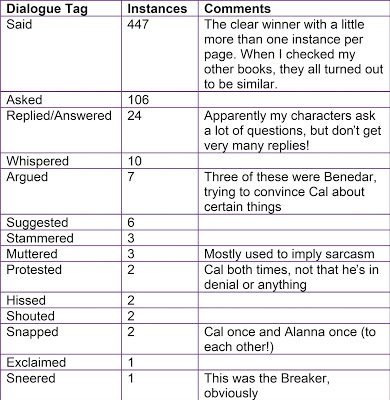
Finally, I looked at an extract from Harry Potter and the Order of the Phoenix by J.K. Rowling. Not just because I love the books and the writing, but because I was curious to see the dialogue tags that were used in the famous scene where Umbridge is asking Snape about the DADA position. Alan Rickman did such a masterful job with all of Snape’s lines, but “Obviously” is one of his more memorable ones.
Here it is:
"You applied for the Defence Against the Dark Arts post, I believe?" Professor Umbridge asked Snape."Yes," said Snape quietly."But you were unsuccessful."Snape's lip curled."Obviously."Professor Umbridge scribbled on her clipboard."And you have applied regularly for the Defence Against the Dark Arts post since you first joined the school, I believe?""Yes," said Snape quietly, barely moving his lips. He looked very angry."Do you have any idea why Dumbledore has consistently refused to appoint you?" asked Umbridge."I suggest you ask him," said Snape jerkily.
I think that J.K. Rowling used a brilliant blend of dialogue tags, action tags and adverbs in this scene. And “Obviously” has its own line on the page, which works perfectly.
Published on October 14, 2017 12:15
October 9, 2017
Spooky Quilling - Worst Fear
 Welcome to the second prompt in the Spooky Quilling challenge! A big thank you to Savannah at The Book Prophet for coming up with such an awesome blogging idea in the run up to Hallowe'en. You can read all about it here and there's still plenty of time to take part. If you're reading this and considering whether or not to sign up, all I can say is: Go for it! You've got nothing to lose, and it's a lot of fun
Welcome to the second prompt in the Spooky Quilling challenge! A big thank you to Savannah at The Book Prophet for coming up with such an awesome blogging idea in the run up to Hallowe'en. You can read all about it here and there's still plenty of time to take part. If you're reading this and considering whether or not to sign up, all I can say is: Go for it! You've got nothing to lose, and it's a lot of fun
Published on October 09, 2017 23:57
October 7, 2017
Writing Research - I Wonder?
As I finalise everything for the release of book six in the series I got to thinking about some of the research I did in an attempt to make Galen's experience of Ancient Rome as accurate as possible. I mean "accurate" in a broad sense because all of the available information has been subjected to some kind of interpretation bias, to a lesser or greater degree!
It left me with a few unanswered questions, which I am still wondering about. Although I haven't been able to find any definitive answers, I thought it would be interesting to blog about two of them.
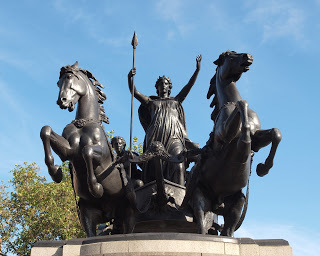 Boudicca's Fate
Boudicca's Fate
Boudicca was the Queen of a Celtic tribe in England called the Iceni. She led a rebellion against the invading Roman army, which happened around 60AD. Her problems all began when her husband died. He'd ruled more or less independently of Rome, but on his death, his will was ignored, and his kingdom was seized. Boudicca and her daughters were supposed to have been treated pretty badly (I won't go into the nasty details).
Her uprising was almost successful. Emperor Nero seriously considered removing Roman forces from Britain entirely. Boudicca commanded an army 100,000-strong and she destroyed three major cities: Camulodunum, Londinium and Verulamium, killing 80,000 Romans and Britons in the process. She was supposed to have left no one alive, burning the cities to make sure of it. Archaeologists found a layer of black ash beneath the modern-day Verulamium which validates this report. However, despite being massively outnumbered (perhaps by as many as twenty to one), the Romans won the final battle, due to a combination of superior strategy, weapons, and discipline.
This is the point at which accounts differ. We are reliant on Roman historians for our knowledge of the entire uprising and, of course, victors are not necessarily the most reliable narrators! The two main sources disagree. Boudicca was said to have either killed herself in shame, or died of an illness and been given a lavish burial. Those two outcomes are pretty different, don't you think? I was curious enough about the whole thing to invent a fictional account of Boudicca for book six, with a magical slant to the story.
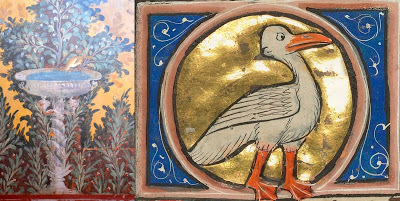 Art: Ancient Rome versus Medieval
Art: Ancient Rome versus Medieval
Although I didn't spend too much time describing the surroundings of Pompeii and Rome, I did refer to the colours and frescoes (wall paintings) in both Seeking Magic and book six. I looked at examples of what had been excavated from Pompeii's ruins and other art from the same time period and I thought it was pretty impressive.
On the left of this picture is a Roman painting and the one on the right is Medieval. As far as I can tell from my research, there are approximately 1,000 years separating the two. From century to century, in more recent times, art has tended to become more sophisticated. Not in this case, however. And, in my uneducated opinion, the earlier Roman painting is the one that would look better on my wall.
I haven't been able to find out why art changed so much after the fall of the Roman Empire. Was it suppressed? Were the skills simply lost? Some sources say that art stopped being aspirational, because the Romans used their art to show an idealised and beautiful version of the world around them. Instead, in the so-called Dark Ages, art became quite controlled with strong links to religion.
Have you ever researched a particular time in our history, either for school, writing, or just general interest? Have you been left with any unanswered questions? I hope you enjoyed today's blog post and thank you for reading!
It left me with a few unanswered questions, which I am still wondering about. Although I haven't been able to find any definitive answers, I thought it would be interesting to blog about two of them.
 Boudicca's Fate
Boudicca's FateBoudicca was the Queen of a Celtic tribe in England called the Iceni. She led a rebellion against the invading Roman army, which happened around 60AD. Her problems all began when her husband died. He'd ruled more or less independently of Rome, but on his death, his will was ignored, and his kingdom was seized. Boudicca and her daughters were supposed to have been treated pretty badly (I won't go into the nasty details).
Her uprising was almost successful. Emperor Nero seriously considered removing Roman forces from Britain entirely. Boudicca commanded an army 100,000-strong and she destroyed three major cities: Camulodunum, Londinium and Verulamium, killing 80,000 Romans and Britons in the process. She was supposed to have left no one alive, burning the cities to make sure of it. Archaeologists found a layer of black ash beneath the modern-day Verulamium which validates this report. However, despite being massively outnumbered (perhaps by as many as twenty to one), the Romans won the final battle, due to a combination of superior strategy, weapons, and discipline.
This is the point at which accounts differ. We are reliant on Roman historians for our knowledge of the entire uprising and, of course, victors are not necessarily the most reliable narrators! The two main sources disagree. Boudicca was said to have either killed herself in shame, or died of an illness and been given a lavish burial. Those two outcomes are pretty different, don't you think? I was curious enough about the whole thing to invent a fictional account of Boudicca for book six, with a magical slant to the story.
 Art: Ancient Rome versus Medieval
Art: Ancient Rome versus MedievalAlthough I didn't spend too much time describing the surroundings of Pompeii and Rome, I did refer to the colours and frescoes (wall paintings) in both Seeking Magic and book six. I looked at examples of what had been excavated from Pompeii's ruins and other art from the same time period and I thought it was pretty impressive.
On the left of this picture is a Roman painting and the one on the right is Medieval. As far as I can tell from my research, there are approximately 1,000 years separating the two. From century to century, in more recent times, art has tended to become more sophisticated. Not in this case, however. And, in my uneducated opinion, the earlier Roman painting is the one that would look better on my wall.
I haven't been able to find out why art changed so much after the fall of the Roman Empire. Was it suppressed? Were the skills simply lost? Some sources say that art stopped being aspirational, because the Romans used their art to show an idealised and beautiful version of the world around them. Instead, in the so-called Dark Ages, art became quite controlled with strong links to religion.
Have you ever researched a particular time in our history, either for school, writing, or just general interest? Have you been left with any unanswered questions? I hope you enjoyed today's blog post and thank you for reading!
Published on October 07, 2017 09:52
October 3, 2017
Spooky Quilling - The Villain's Story
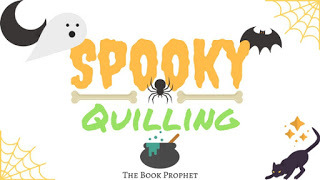 I'm excited (and nervous!) to be able to say that I've signed up for a writing challenge with a Hallowe'en theme this month. It's being run by Savannah at The Book Prophet and you should definitely check out her blog - you'll find reviews, writing, other bookish insights, and a lot of interesting ideas. Like this challenge, for example!
I'm excited (and nervous!) to be able to say that I've signed up for a writing challenge with a Hallowe'en theme this month. It's being run by Savannah at The Book Prophet and you should definitely check out her blog - you'll find reviews, writing, other bookish insights, and a lot of interesting ideas. Like this challenge, for example!Anyway, on to Spooky Quilling...
You can read all about it here
There are five prompts and this is the first. It involves writing a 666-word story to explain the backstory of a villain (either one in your imagination or one in an existing story). This kind of writing is way out of my comfort zone, because I rarely write short stories, and I up to now I've only written stories about magic. Sticking to an exact word count was kind of tough as well.
(Do you see how I'm setting up the excuses before I share any of my writing?)
This is the story of my villain. He or she is completely imaginary and I very much hope we never meet. Thank you for reading!
She gave each of us the choice of making dreams or nightmares for the humans. By the time she got to me, all had chosen dreams. A predictable outcome. Yet she needed to create some darkness if the humans were ever to reach their full potential. Light and dark each grant visibility, the one to the other. And I never shrink from what must be done. Not now, and not then.I chose nightmares. She smiled. “I might have guessed,” she said. “Very well. But take care you don’t lose yourself. The darkness has its own allure.”Those early human nightmares were not sophisticated. All I did was magnify the worst of their waking lives. I invaded their unconscious minds and made them relive moments of my choosing with an extra layer of unpleasantness. I created fantastical monsters and I mocked their hopes and their desires. I twisted their memories into ugly parodies of the truth.It wasn’t enough. I could tell she was disappointed and I knew I could do better. I sensed I was missing something. Then, one day, I found it. The fear of death. It was a rare human who did not possess it. And if they did not fear death itself, they invariably feared the means by which they would die.Yes… they feared it. They dreaded it. And I embellished those fears. I lurked patiently in the shadows of their minds, until I found what I was looking for. Until I found what would cause their beating hearts to falter, as they experienced terror so acute it would feed itself, keeping them trapped in the nightmare and at my mercy. And mercy was not in my job description.Sleep does not just incapacitate the body. It also leaves the mind wide open to manipulation. In the lonely depths of the night, humans are at their most suggestible. It was a game to me. I learned how to locate the dark strands drifting in their subconscious, the ones that would lead me right to the fears they tried to keep hidden, even from themselves. But they could not hide them from me.Some humans were afraid of torture. The kind of agony that would steal their sanity and their dignity. Many could not bear the sensation of falling and being utterly powerless to stop their descent. I made the ground disappear from under them and their horror would explode as if their entrails had already splattered all over the sidewalk.Some hated the thought of suffocating, perhaps with half-decomposed hands squeezing their throat, or locked in an underground room filling inexorably with freezing water. Others did not want to die alone. Those, I would bury alive with no way to raise the alarm, then introduce hundreds of scuttling, ravenous creatures to keep them company.My favorite moment was showing them that someone they loved was to blame. I’d create an image of this other human, whose face would twist with malice as they laughed at the stupidity of the human in the nightmare for ever trusting them. I became very good at it. For some humans the nightmares persisted, even when they woke.She told me it was enough. I told her I agreed. But it wasn’t enough for me. I could do more. I knew it. If I could make them doubt what was real, if I could bring the nightmares into their waking world, I could haunt the humans there too. I could magnify their fears until fear was all they knew. I just needed a bridge. A human to let me in. As it turns out, I found more than one. Many more. Together they and I created so much fear that nearly everyone has nightmares these days. But I still enjoy making them unbearable for a lucky few. She warned me I might lose myself, but I think I've found my true calling.Perhaps you and I will meet one day. Or night. Sleep well, won't you?
Published on October 03, 2017 00:02



